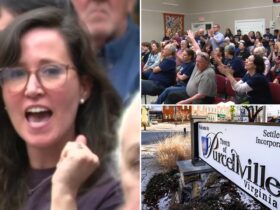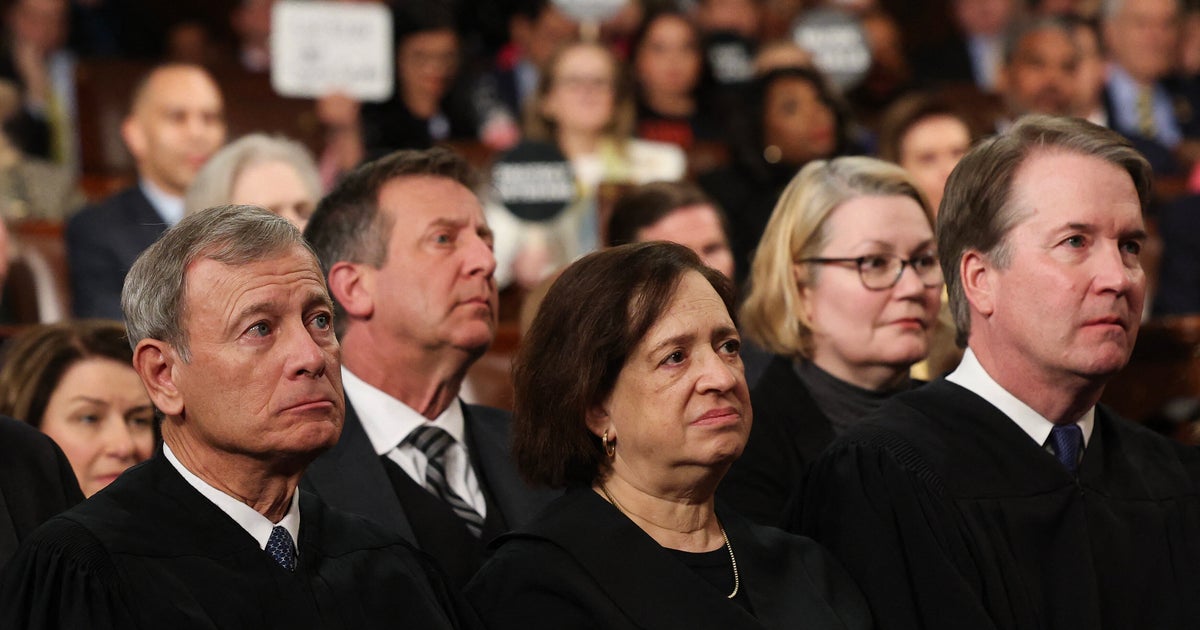Over the Easter weekend, the Supreme Court issued a remarkable order in the wee hours of Saturday morning blocking President Donald Trump from immediately removing a group of Venezuelan immigrants from a detention center in Texas and, potentially, sending them to a notorious prison in El Salvador.
The court’s order came amid a frenzy of legal filings by lawyers for a handful of Venezuelans detained at the Bluebonnet Detention Facility in Anson, Texas. Those detainees reported that they were being pressured to sign forms affirming their alleged membership in the gang Tren de Aragua and told they would be removed from the country within 24 hours to El Salvador.
By Friday night, lawyers for the American Civil Liberties Union representing two of the detained men reported in a brief to the Supreme Court that detainees had been loaded onto a bus en route to an airport for removal.
The administration’s “lightning fast timeline” for the deportations, as the ACLU called it, came despite the Supreme Court ruling on April 7 in a separate case that the government must provide advance notice and warning to detainees if they’ll be removed from the country, and allow them the opportunity to contest their detention and removal through a habeas challenge in court. That is not what it looked like the government was doing at Bluebonnet.
The ACLU appealed the apparently imminent deportations up to the 5th U.S. Circuit Court of Appeals and filed an emergency application at the Supreme Court. The civil liberties group sought a classwide certification that would apply to all of the men detained as alleged members of Tren de Aragua at Bluebonnet, not just their clients, and an order restraining the government from removing them without giving them 30 days’ notice and the ability to file habeas petitions.
In a 7-2 vote, the court’s 1 a.m. order forbade the administration from removing “any member of the putative class of detainees from the United States until further order of this Court.”
The court’s intervention had an effect even before its order came down. The buses carrying the Venezuelan detainees to the airport turned around and returned to Bluebonnet after the ACLU filed its emergency application with the Supreme Court, according to NBC News.
The administration’s breakneck attempt to sneak through more removals was just the latest in a growing list of ways it has sought to disobey and defy the courts, including the Supreme Court, as it relates to individuals dispatched to El Salvador’s CECOT prison under the Alien Enemies Act. Perhaps the court’s middle-of-the-night intervention is a signal that it’s finally had enough.
WIN MCNAMEE via Getty Images
The court’s intervention here is remarkable due to its speed, its rebuke of the administration and the court’s seeming belief it had to issue an order without even waiting for Justice Samuel Alito to write a dissent. That dissent, released later on Saturday and joined by Justice Clarence Thomas, nitpicked at procedural issues that Alito ultimately got wrong.
There is every reason for the justices here to be done treating the Trump administration as a normal presidential administration simply seeking the normal advantages such administrations do in the courts. At every turn, the administration has lied, obfuscated, made up facts and dragged its feet to disobey district courts, appeals courts and the Supreme Court both in public comments and before those very courts.
The lies and misrepresentations the Trump administration has made in public forums are too many to mention, from White House domestic policy adviser Stephen Miller falsely declaring that the Supreme Court ruled 9-0 in the administration’s favor (it was the opposite) to Trump holding up a digitally altered photograph of Kilmar Abrego Garcia’s hand tattoos to claim they showed his membership in the gang MS-13 (there is no evidence of this). But they are not necessarily part of the court record. Lies and misrepresentations in legal filings, however, are.
In its most recent brief opposing the ACLU’s request to stop the deportations, filed after the court’s 1 a.m. order, administration lawyers argued that the ACLU should lose its claim for relief for its clients or classwide protection for all of the men at Bluebonnet because it didn’t give the lower courts enough time to rule before appealing to the 5th Circuit and the Supreme Court.
“[A]pplicants gave the district court a mere 42 minutes’ notice before divesting it of jurisdiction by filing a notice of appeal claiming constructive denial of relief,” the brief states. “Under these highly irregular circumstances, applicants can hardly establish a clear and indisputable entitlement to the extraordinary relief they seek. The application should be denied on that basis alone.”
That “does not accurately state the sequence of events in the lower courts,” the ACLU notes in its reply brief filed with the Supreme Court on Monday.
The ACLU’s request for a temporary restraining order to prevent the removal of the Bluebonnet detainees was filed 14 hours before the group appealed to higher courts in an attempt to get a ruling before its clients were removed from the country. It also came after District Judge James Wesley Hendrix indicated he would hear the case later on Saturday, potentially after the detainees had been removed from the country. It was also the second request for a restraining order after Hendrix denied the ACLU’s first request on April 17.
“Applicants submitted evidence that the government was threatening to remove putative class members on the evening of April 18,” the ACLU brief states. “If Applicants had waited for the district court to rule, most class members’ claims would never have been heard.”
And if those claims were not heard before the administration removed the detainees, they could have been rendered to a foreign prison — where the administration claims they are no longer subject to U.S. courts or U.S. law.
Additionally, the facts presented in this case show that the Trump administration is wantonly disobeying the Supreme Court’s April 7 decision in the case of J.G.G. v. Trump, in which it ruled that migrants must be given a chance to bring a legal challenge against their removal.
The ACLU specifically called out the government’s practices of moving people between judicial districts, giving Spanish-speakers documents written only in English, notice periods of less than 24 hours, and not providing any information on how to appeal.
“The government’s actions since the April 7 J.G.G. ruling,” the ACLU states in its brief, “cannot by any stretch be said to comply with this Court’s order that notice must be sufficient to permit individuals actually to seek habeas review.”
Administration lawyers also continue obfuscating and misrepresenting facts in the case of Kilmar Abrego Garcia, a man the administration admits was deported by mistake, which has become the most high-profile case to come out of the Alien Enemies Act removals to CECOT on March 15.

On April 11, the Supreme Court ordered that the administration “facilitate Abrego Garcia’s release from custody in El Salvador and to ensure that his case is handled as it would have been had he not been improperly sent to El Salvador.”
But government lawyers have repeatedly refused to comply with District Judge Paula Xinis’ orders to answer specific questions about Abrego Garcia in daily status updates, varyingly claiming different privileges to withhold information or that the president cannot disclose diplomatic negotiations to the court.
The Trump administration failed to note, or perhaps did not even know, that Abrego Garcia had been moved from CECOT to another detention facility in El Salvador. It refused to provide documents on Monday in response to questions from Abrego Garcia’s lawyers that were ordered by the court. And it has repeatedly misrepresented what the Supreme Court ordered it to do.
In a joint status report to Xinis’ court filed on Monday, the administration misquoted the Supreme Court’s decision ordering the facilitation of “Abrego Garcia’s release from custody in El Salvador,” instead quoting it as requiring the administration to “take all available steps to facilitate the return of Abrego Garcia to the United State [sic].” That latter quote, including the misspelling of United States, does not appear anywhere in the Supreme Court decision.
The administration further states that it does not need to provide answers to court-ordered interrogatories from Abrego Garcia’s lawyers because they are “based on the false premise that the United States can or has been ordered to facilitate Abrego Garcia’s release from custody in El Salvador.” But that is exactly what the Supreme Court ordered.
Xinis called out this falsehood in an order requiring the administration to fully comply with the ordered discovery on Tuesday.
“Defendants—and their counsel—well know that the falsehood lies not in any supposed ‘premise,’ but in their continued mischaracterization of the Supreme Court’s Order,” Xinis wrote.
She added that the administration’s entire reasoning to not comply represented “a willful and bad faith refusal to comply with discovery obligations.”
This all shows a willful disregard for the authority of the Supreme Court and the lower courts. The administration has been itching for a fight with the courts since Trump took office. The justices’ intervention in the Bluebonnet case on Saturday is the first indication that they may join that fight and assert the judiciary’s equal role as a branch of government.
















Leave a Reply